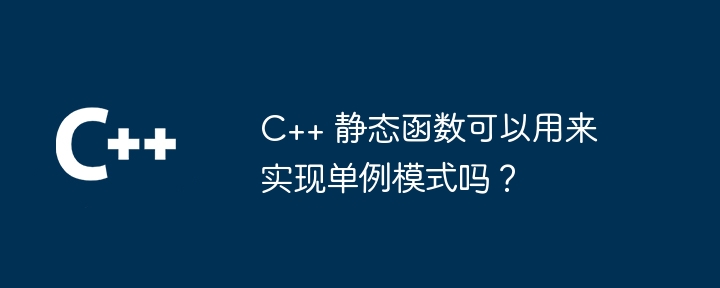c++++ 中使用静态函数实现单例模式可以通过以下步骤:声明私有静态成员变量存储唯一实例。在构造函数中初始化静态成员变量。声明公共静态函数获取类的实例。

C++ 中使用静态函数实现单例模式
引言
单例模式是一种设计模式,它确保一个类只有一个实例存在。在 C++ 中,可以使用静态函数来轻松实现单例模式。
语法
静态函数是属于类而非对象的函数。它们使用 static 关键字声明,语法如下:
static return_type function_name(argument_list);实现单例模式
要使用静态函数实现单例模式,请执行以下步骤:
- 声明一个私有静态成员变量来存储类的唯一实例:
private:
static ClassName* instance;- 在类的构造函数中初始化静态成员变量:
ClassName::ClassName() {
if (instance == nullptr) {
instance = this;
}
}- 声明一个公共静态函数来获取类的实例:
public:
static ClassName* getInstance() {
if (instance == nullptr) {
instance = new ClassName();
}
return instance;
}实战案例
假设我们有一个 Counter 类,它负责跟踪计数器值:
class Counter {
private:
static Counter* instance;
int count;
public:
Counter();
static Counter* getInstance();
void increment();
int getCount();
};以下是 Counter类的实现:
// 构造函数
Counter::Counter() : count(0) {}
// 获取类的实例
Counter* Counter::getInstance() {
if (instance == nullptr) {
instance = new Counter();
}
return instance;
}
// 增加计数器
void Counter::increment() {
++count;
}
// 获取计数器值
int Counter::getCount() {
return count;
}使用示例
我们可以使用 getInstance() 函数多次获取 Counter 类的实例,但只会创建一个实例:
Counter* counter1 = Counter::getInstance();
counter1->increment();
Counter* counter2 = Counter::getInstance();
counter2->increment();
std::cout << counter1->getCount() << std::endl; // 输出:2结论
使用静态函数来实现单例模式是一种简单、有效的技术。它允许您强制执行对类的单例约束,确保始终返回同一实例。



